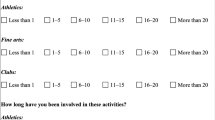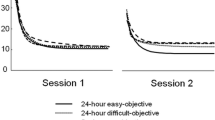Abstract
Level of aspiration on a problem-solving task was hypothesized to (a) depend on achievement on a previous problem-solving task, (b) be higher in males than in females, and (c) be related to long-term educational aspirations. College students (28 males and 31 females) were divided into high achievers and low achievers based on their performance on Problem Set A. High achievers made higher estimates for their performance on Problem Set B than low achievers. Males made higher estimates and performed better on Problem Set B than females. However, estimates were not related to students’ long-term educational aspirations. The low achievers improved significantly more than the high achievers lost on Problem Set B. The low achievers also set a positive goal discrepancy whereas the high achievers did not.
Similar content being viewed by others
References
BERSTEIN, D. A., ROY, E. J., WICKENS, C. D., & SRULL, T. K. (1988). Psychology. Boston: Houghton Mifflin Co.
CHILD, I. L., & WHITING, J. W. (1949). Determinants of level of aspiration: Evidence from everyday life. Journal of Abnormal and Social Psychology, 44, 303–314.
FRANK, J. D. (1935). The influence of the level of performance in one task on the level of aspiration in another. Journal of Experimental Psychology, 18, 159–171.
FRANK, J. D. (1941). Recent studies of the level of aspiration. Psychological Bulletin, 38, 218–226.
GARLAND, H., & ADKINSON, J. H. (1987). Standards, persuasion, and performance: A test of cognitive mediation theory. Group and Organization Studies, 12(2), 208–220.
GEBHARD, M. E. (1948). The effect of success and failure upon the attractiveness of activities as a function of experience, expectation, and need. Journal of Experimental Psychology, 38, 371–388.
GOULD, R. (1938). Factors underlying expressed “level of aspiration.” The Journal of Psychology, 6, 265–279.
GOULD, R. (1941). Some sociological determinants of goal strivings. The Journal of Social Psychology, 13, 461–473.
GREENBERG, J. (1985). Unattainable goal choice as a self-handicapping strategy. Journal of Applied Social Psychology, 15(2), 140–152.
HOPPE, F. (1930). Erfolg und Misserfolg. Psychologische Forschung, 14, 1–62.
LEWIN, K., DEMBO, T., FESTINGER, L., & SEARS, P. S. (1944). Level of aspiration. In J. McV. Hunt (Ed.), Personality and the behavior disorders, Vol. I (pp. 333–378). New York: Ronald.
MORGAN, D. L., & BUSKIST, W. (1987). “Level of aspiration”: Preference for time versus response feedback and history effects on the setting of personal performance standards. The Psychological Record, 37, 199–211.
PAL, R., & DIXIT, S. K. (1983). Development of level of aspiration in relation to grade and sex. Asian Journal of Psychology and Education, 12, 1–4.
PAL, R., JAIN, P., & TIWARI, G. (1985). Self concept and level of aspiration in high and low achieving higher secondary pupils. Perspectives in Psychological Researches, 8, 49–53.
PAPALIA, D. E., & OLDS, S. W. (1988). Psychology (2nd ed.). New York: McGraw-Hill.
SIRY, J. (1987). Level of aspiration and students’ performance on a concept-formation task. Psychological Reports, 60, 639–646.
STERNBERG, R. J., & DAVIDSON, J. (1982). The mind of the puzzler. Psychology Today, 16(6), 37–44.
TEEVAN, R. C., SMITH, B. D., GREENFELD, N., LOOMIS, D. J., & HANCOCK, J. G. (1981). Practice, performance, and level of aspiration. Psychological Reports, 48, 971–977.
TIWARI, G., KUMAR, R., & MORBHATT, K. (1980). Level of aspiration as function of anxiety & sex among high and low achievers. Indian Psychological Review, 19, 46–50.
Author information
Authors and Affiliations
Rights and permissions
About this article
Cite this article
Siry, J.M. Level of Aspiration of High and Low Achievers on A Problem-Solving Task. Psychol Rec 40, 197–206 (1990). https://doi.org/10.1007/BF03399558
Published:
Issue Date:
DOI: https://doi.org/10.1007/BF03399558




